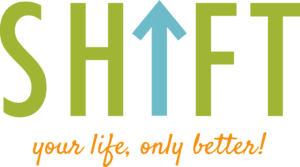
As a contemporary practice, TherapyWorks is pleased to offer private coaching and mentoring to improve the personal and professional lives of our clients. As an alternative to couch-based counseling, our SHIFT program provides an innovative approach to changing your life for the better. Through a fusion of motivation and accountability, emotional understanding and practical skill building, the fast moving effectiveness of coaching will allow you to increase clarity and raise awareness, identify intentional goals, and ignite positive change for optimal potential and sustainable results.
All coaching and mentoring services offered by the SHIFT Program are meant to challenge and support you both personally and professionally. The coaching relationship is collaborative – we invite you to ask questions, challenge yourself and share your insights as they develop. However, it is important to distinguish that coaching is not psychotherapy. Although commonalities exist, there are distinct differences between coaching and counseling services as described below.
COACHING
Coaching is the future-focused practice of partnering with clients in a thought-provoking, transformative and creative process that inspires them to maximize their personal and professional awareness, inspire discovery and growth and improve potential.
A coach helps:
- Establish intentional goals
- Identify and clarify immediate needs and areas for personal improvements
- Design an individualized plan of action based on client strengths
- Develop or improve skills for discovery and growth
- Implement a plan of action
- Maintain responsibility and accountability
- Create outcomes for desired change
Benefits of coaching usually include:
- Obtaining clarity of your values, goals, strengths, talents and abilities
- Creating paths to achieve value-aligned goals
- Increased sense of personal and/or professional satisfaction
PSYCHOTHERAPY
Psychotherapy is the practice of performing service with individuals, couples, or groups wherein interpersonal relationships are examined for the purpose of achieving more adequate, satisfying, and productive marriage and family therapy adjustments.
A therapist:
- Assesses mental, emotional and behavioral health disorders
- Is able to diagnoses mental health disorders
- Develops treatment plans aligned with presenting symptoms and diagnosis
- Process and explore personal and family history
- Seeks to resolve underlying issues causing mental and/or emotional problems
- Implements interventions and offers treatment
Benefits of psychotherapy:
- Discover and manage diagnostic considerations
- Reduce mental and emotional symptoms
- Resolve past personal and family matters
- Relieve emotional distress
- Improve interpersonal relationships
Due to commonly shared philosophies and systems of change, coaching and therapy may look and sounds similar. Although coaching can be used to augment a therapy experience, the work of coach is not meant to assess or treat mental or emotional disorders. If during the coaching relationship it is determined that psychotherapy would be appropriate or beneficial, a referral to a trusted counselor will be recommended and provided.
